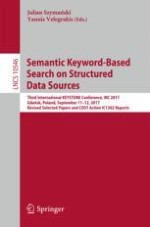This book constitutes the thoroughly refereed post-conference proceedings of the Third COST Action IC1302 International KEYSTONE Conference on Semantic Keyword-Based Search on Structured Data Sources, IKC 2017, held in Gdańsk, Poland, in September 2017.
The 13 revised full papers and 5 short papers included in the first part of the book were carefully reviewed and selected from numerous submissions. The second part contains reports that summarize the major activities and achievements that have taken place in the context of the action: the short term scientific missions, the outcome of the summer schools, and the results achieved within the following four work packages: representation of structured data sources; keyword search; user interaction and keyword query interpretation; and research integration, showcases, benchmarks and evaluations. Also included is a short report generated by the chairs of the action. The papers cover a broad range of topics in the area of keyword search combining expertise from many different related fields such as information retrieval, natural language processing, ontology management, indexing, semantic web and linked data.
